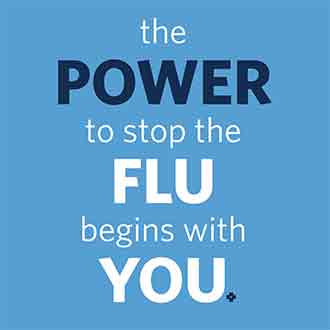Mark Flu Off Your List of Worries during COVID-19 with Annual Flu Vaccine

Each year millions of Americans get sick with seasonal flu, a virus that can lead to respiratory troubles, pneumonia and hospitalization. As we enter flu season while still grappling with a pandemic, taking a flu vaccine can lower your risk of getting sick.
“The flu vaccine can reduce your risk for flu by 40-60 percent,” said Dr. Brian Fillipo, Wayne UNC Health Care Vice President of Medical Affairs and Chief Medical Officer. “If you still get the flu after getting the vaccine, you often experience a milder form of the virus and are sick for fewer days.”
With the risk of contracting COVID-19 also on everyone’s minds, a flu shot can give you peace of mind, taking the flu off the list of potential respiratory problems you will experience this year.
Get Your Flu Shot Annually
During the 2018-19 flu season, only half of the U.S. population received their flu shot. Experts estimate the vaccine prevented an estimated 4.4 million flu illnesses and 3,500 flu-related deaths. The flu vaccine protects against the four most prevalent circulating flu viruses.
Dr. Fillipo says it’s critical to get your flu shot every year, because flu viruses change with every season. “Also, your body’s immunity to flu viruses – whether you acquired it naturally or through the vaccine – will decrease over time,” said Dr. Fillipo. “Getting the vaccine each year is the best way to stay ahead of the flu.”
Should I get a flu vaccine?

Experts recommend an annual flu vaccine for anyone above the age of six months, except those with severe, life-threatening allergies to the vaccine or its ingredients.
“Because we face a prospect of getting both the flu and COVID-19 this year, we’re encouraging everyone to get the vaccine,” said Dr. Fillipo. “This lets people protect themselves but also prevents our hospitals from becoming overwhelmed with patients.”
While you’re getting your flu shot, if you have children under the age of two, are over the age of 65 or have a chronic health condition, you should also consider getting a pneumonia vaccination. Talk to your provider or your child’s healthcare provider to learn more.
Will the Vaccine Give Me the Flu?
Flu vaccines are sometimes made with a flu virus, but not a live one. Therefore they can’t give you the flu, said Dr. Fillipo. Mild side effects may be seen after receiving a flu vaccine. This is your body’s response to learning to fight the flu virus.
Some common side effects can include a mild fatigue, headache, low-grade fever and pain at the injection site. These side effects should clear up in two to three days.
Because it’s also cold and flu season right now, you could get a cold, unrelated to the vaccine. It’s also possible that you can contract a different strain of the flu, said Dr. Fillipo.
Will the Flu Vaccine Protect Me from COVID-19?
While COVID-19 and the flu have similar symptoms and both are contagious, infectious respiratory illnesses, they are caused by different viruses.
“The more you limit your chances for getting any respiratory virus, the better,” said Dr. Fillipo. “Because the symptoms are similar, you could have the flu and think it’s COVID-19 or vice versa.”
Practices put in place to protect us from COVID-19, such as mask wearing and vigilant hand hygiene, will also aid in the fight against acquiring the flu.
Get Your Vaccine Today
Most primary care providers and retail pharmacy chains began offering flu shots in September. The Centers for Disease Control and Prevention recommends getting a vaccine in September or October to make sure you’re immunized before you encounter the flu. However, if you miss that window, you should still get your flu shot in the winter.
“If you’re over the age of 65 or at a high risk of complications from the flu, don’t wait,” said Dr. Fillipo. “You’re generally at a higher risk if you’re younger than two, over the age of 65, pregnant or immediately postpartum, live in a nursing home or have chronic illnesses or chronic immune-suppressing conditions like diabetes and cancer.”
If you have insurance, flu vaccines at most pharmacies, doctor’s offices and urgent care centers are free. Without insurance, you’ll pay more out of pocket, but many pharmacies and providers have programs that offer discounted flu shots in addition to in-store discounts.
Vaccinefinder.org is a helpful tool for finding locations near you that have the flu shot available.